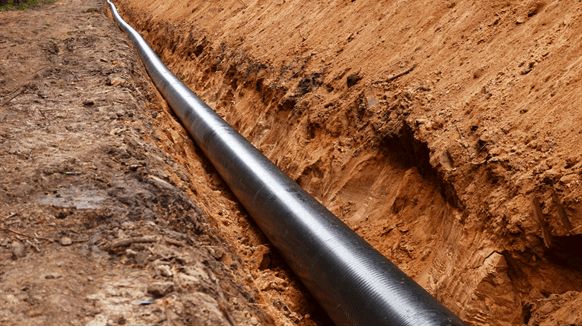
(Bloomberg) -- The U.S. Supreme Court ruled that natural-gas pipeline projects with federal approval can seize state-owned land, boosting PennEast Pipeline Co.’s planned 116-mile line through Pennsylvania and New Jersey.
In a 5-4 ruling Tuesday that asserted a broad federal power to acquire lands needed for national infrastructure projects, the justices rejected New Jersey’s contention that sovereign immunity shields the state from being sued by PennEast.
The pipeline would carry as much as 1 billion cubic feet of natural gas per day from northern Pennsylvania to New Jersey. PennEast, a joint venture of five companies including Southern Co. and Enbridge Inc., still must secure state-level permits, something that may prove difficult in New Jersey, according to Bloomberg Intelligence analyst Brandon Barnes. He said the project still has “low odds.”
PennEast hailed the ruling as a step toward more affordable, reliable energy, while New Jersey and environmental groups vowed to keep fighting.
The ruling “protects consumers who rely on infrastructure projects -- found to be in the public benefit after thorough scientific and environmental reviews -- from being denied access to much-needed energy by narrow state political interests,” said Anthony Cox, chairman of the PennEast board of managers.
The decision “is not the end of the road in our fight against the PennEast pipeline,” New Jersey Attorney General Gurbir Grewal said in an emailed statement. “We still have other, ongoing legal challenges to this proposed pipeline, which is unnecessary and would be destructive to New Jersey lands.”
Still, the ruling is a broad victory for pipeline companies, giving them new leverage in dealing with state officials.
Infrastructure Power
The case split the court along unusual lines, with Justices Amy Coney Barrett, Clarence Thomas, Elena Kagan and Neil Gorsuch dissenting.
Writing for the court, Chief Justice John Roberts said the federal government can constitutionally delegate its power to use eminent domain to secure land-use rights -- even if that means suing a state.
Roberts said that authority helped fulfill the constitutional framers’ goal of a “cohesive national sovereign.”
“Over the course of the nation’s history, the federal government and its delegatees have exercised the eminent domain power to give effect to that vision, connecting our country through turnpikes, bridges, and railroads -- and more recently pipelines, telecommunications infrastructure, and electric transmission facilities,” Roberts wrote.
At issue was a U.S. Natural Gas Act provision that lets pipeline companies use the federal government’s eminent domain power. After the Federal Energy Regulatory Commission approved the pipeline in 2018, PennEast sued to gain access to more than 40 parcels that are either owned or partially controlled by New Jersey.
But a Philadelphia-based federal appeals court said that, while the law gives companies eminent domain powers, it doesn’t let them sue states to enforce those rights. The panel pointed to the Constitution’s 11th Amendment, which limits the circumstances in which private parties can sue states without their consent.
Rejecting those arguments, Roberts said lawsuits like the one filed by PennEast “do not offend state sovereignty, because the states consented at the founding to the exercise of the federal eminent domain power, whether by public officials or private delegatees.”
Barrett Dissent
In dissent, Barrett said that assertion “has no textual, structural, or historical support.” She said that if the federal government wants to take state-owned land, it must do so itself, rather than delegating the power to a private party.
“The Constitution limits the means by which the federal government can impose its will on the states,” Barrett wrote.
Jim Waltman, the head of a group that has been fighting the PennEast project for seven years, said he was “extremely disappointed” in the ruling.
“Our fight against PennEast is far from over,” said Waltman, executive director of the Watershed Institute. “The proposed pipeline project still faces many legal and regulatory obstacles.”
Another opponent, the New Jersey Conservation Foundation, said the ruling puts preserved New Jersey land in “great jeopardy.”
“The PennEast pipeline would threaten the health and safety of our communities, seize private land and taxpayer-preserved open space, and harm our drinking water, natural and historic resources,” said Tom Gilbert, the group’s campaign director.
The case is PennEast v. New Jersey, 19-1039.
© 2021 Bloomberg L.P.




No comments:
Post a Comment